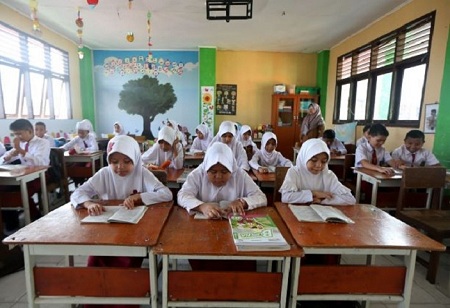Indonesia has seen improvements in education quality and youth employment, yet remains well below the Southeast Asian average, a recent ASEAN survey has found. With a large young population that is significantly less competitive than their counterparts in neighboring countries, experts warn that Indonesia may face great hurdles if it does not remedy these issues. The improvement was recorded in the 2022 ASEAN Youth Development Index published in late July. The report, made by the ASEAN Secretariat, compared key data relevant to the region’s youth, aged 15 to 35, sourced from various organizations including the World Bank and the International Labor Organization (ILO). Indonesia scored 0.544 for its Youth Development Index (YDI) in the education category, higher than Cambodia (0.24) and Laos (0.239) but ranked 7th among the 10 ASEAN member countries and still below the regional average of 0.56. Meanwhile, in the youth employment category, Indonesia ranked 8th with a YDI of 0.437, above Brunei Darussalam (0.413) and the Philippines (0.341). Yet, Indonesia was still below the regional average (0.54).
Indicators used to measure education quality included youth literacy rate, education attainment rate and digital fluency. Meanwhile, the index for the employment category was measured using the youth unemployment rate, labor force participation and the percentage of youths not in education, employment or training (NEET). Indonesia also scored below average in several other indicators, including equity and inclusion for basic amenities and youth civic participation. The report suggested that Indonesia might still benefit from policies aiming to reduce its unemployment rate and share of NEET. To address other issues, Indonesia may also benefit from targeted regulations on severe disabilities and child marriage. There is a strong correlation between Indonesia’s poor education system and its lower employment rate, experts and officials concurred. The country’s education system stood at the core of the problem, they argued. The current model was deemed insufficient in preparing the youth to adapt to a fast changing modern world, subsequently pushing the unemployment rate up. With only 6 percent of the population holding a university level degree, most Indonesians enter the workforce with an education level of high school or lower. But the country’s basic schooling system is riddled with problems and has been insufficient in equipping students with the necessary skills to be competitive in the job market.
There are many problems, including poor access to education in many parts of the country, subpar teacher competency and the failure to adapt the education system to a post digital world, the Association for Education and Teachers head of education, research and development. The school system, still prioritizes old ways of learning based on memorization, standardized tests and ranking systems. This system has led the majority of young Indonesians to be rendered uncompetitive when facing the modern working landscape, which values critical thinking and collaboration. Triyono, a labor expert from the National Research and Innovation Agency (BRIN), We are living in a time of the ‘industrial revolution 4.0, and the school system has been unable to match itself with that reality.

